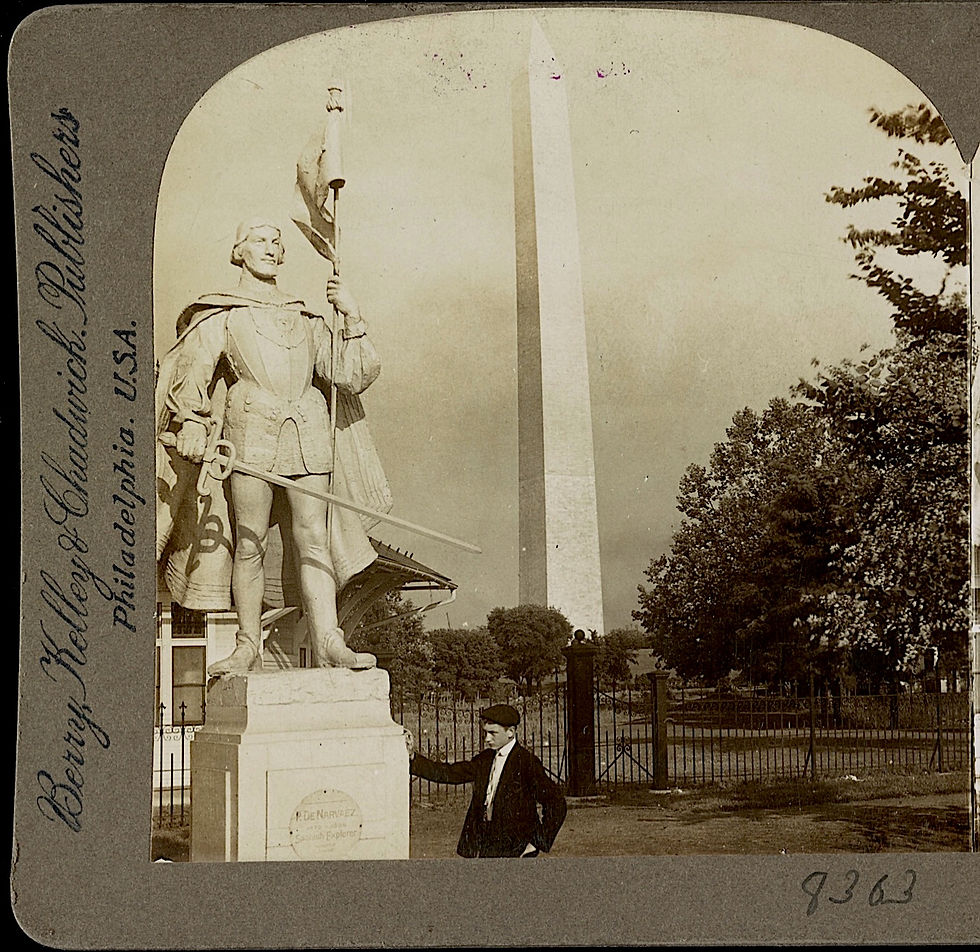- vesmiths
- Dec 4, 2025
- 2 min read

The Narváez expedition of 300 men headed inland on May 1, 1528, about three weeks after landing near Tampa Bay in Florida. In some ways, they were ill-prepared and unlucky. First, on their storm-bedeviled way to La Florida, Narváez passed up the opportunity to make a final stop at Havana to replenish supplies and take on more horses and men. The voyage from Spain had been underway for 16 months already. It took them seven weeks just to work through more storms and groundings between Cuba and Florida. When they finally landed on April 10, some miles north of Tampa Bay’s main entrance, they mistakenly thought they were south of it—a fatal error as it turned out. The expedition marched inland and northward, each man provisioned with only two pounds of biscuit and a half pound of bacon. They likely assumed they would meet up with the ships again at Tampa Bay and could pick up more supplies to be brought from Cuba. In fact, the ship crews would never see them again, despite searching the Gulf Coast for nearly a year.
Another serious shortcoming was the lack of an interpreter of the local native languages. Previously, Hernán Cortés, in his dealings with the Mexica and Maya, had the great advantage of two interpreters (La Malinche and Jerónimo de Aguilar) to navigate between Nahuatl, Maya, and Spanish. That played a big role in developing his strategy for the conquest of Mexico.
But the Narváez expedition inadvertently provided an interpreter and guide for the De Soto expedition 11 years later. Two men of a Narváez ship that had returned from Cuba and was looking for the land party, went ashore at Tampa Bay and were captured by natives of the Ucita tribe. One man was killed outright and the other, Juan Ortiz, was on the verge of being burned alive when the chief’s daughter intervened—a Pocahontas-like story except that he lived more like a slave than friend of the family. As the story goes, three years later when the chief Ucita again decided to sacrifice him, the daughter helped him escape to a more friendly chief named Mocoso from a rival tribe. That chief promised to return Ortiz to his countrymen should the opportunity ever occur, which it did with the arrival of De Soto. By then, Ortiz spoke at least two native languages and was well-versed in their cultures. He helped guide them all the way to the central Mississippi Valley, where his death was a great loss to the expedition.
- vesmiths
- Nov 14, 2025
- 2 min read
Updated: Dec 4, 2025

I asked this question of my recent acquaintance, Mr. Chat GPT: “Who are the best-known Spanish explorers in American history, in order of their notoriety?”
Here’s the list in order, based on surveying the Web:
1. Christopher Columbus
2. Hernán Cortés
3. Francisco Pizarro
4. Ferdinand Magellan
5. Juan Ponce de León
6. Francisco Vázquez de Coronado
7. Hernando de Soto
8. Vasco Núñez de Balboa
9. Álvar Núñez Cabeza de Vaca
Wikipedia provides a very long list of explorers, their nationalities, and locations they explored, starting with the Egyptian Nehsi in the 15th century BC and including American astronauts. Cabeza de Vaca is there, described as having explored the future United States, Mexico, and Argentina—the latter as leader of his own expedition, following his Narváez experience. Interestingly, the only Narváez mentioned in this list is José María Narváez, a 19th-century Spanish naval commander who explored the Pacific Northwest and served in the Mexican War of Independence. I think Pánfilo de Narváez has been slighted, since he did lead the first major expedition through central to northern Florida and along the entire northern Gulf Coast before it ended disastrously on the coast of Texas. But unlike other conquistadors, he seems to have left no personal record of his career or other writings about himself, according to Chat Gpt. Apparently, he was not a literary kind of guy. All we know about him comes from the Cabeza de Vaca account of his expedition and from the writings of other contemporaries. Although Narváez seemed to imagine himself becoming a great figure in the history of conquests, he was content to let others define his legacy.
Interestingly, in 1906 a rather heroic statue of Pánfilo de Narváez stood near the Washington Monument, along with one of Andrew Jackson. Yes, Narváez—not Christopher Columbus, Juan Ponce de León, or Hernando de Soto! Back then at least, his expedition must have been considered an important milestone in the founding of America. And what did those historians of 1906 think Narváez and Jackson had in common? Well, they were both authoritarian, vain, impetuous, and bent on conquest and glory. Does that ring any bells today?

- vesmiths
- Oct 28, 2025
- 1 min read

While the expedition was intact, the place where this force of some 270 men spent the most time—about six weeks—was the boat-building campsite at the so-called Bay of Horses, most likely along the St. Marks estuary. There, they constructed five of their ~40-foot boats out of wood, metal, pine pitch, and fibers, built shelters, killed and ate their remaining 17 horses, and buried their dead. All of this activity left quite a mess, and the Soto expedition, which visited the site 11 years later, saw plenty of it left: horse bones, forges, fire pits, etc. But in Florida’s subtropical climate, what could possibly remain nearly 500 years later? Possibly bits of metal slag and charcoal from the forges, fragments of native pottery they made use of, personal jewelry buried with the Spanish dead. Even if no horse bones remain by now, what about horse teeth? In the 1980s archaeologists from the Florida Museum of Natural History in Gainesville collected cow bones and this single horse tooth at the 16th–century Puerto Real townsite on the north coast of Haiti (western Hispaniola). Its DNA is the earliest known from domesticated Spanish horses in the Americas. https://pubmed.ncbi.nlm.nih.gov/35895670/ It also provided evidence that the wild Chincoteague ponies of Assateague Island off Maryland and Virginia are descendants of Spanish horses. https://www.kcci.com/article/centuries-old-horse-tooth-last-piece-genetic-puzzle-assateague-horses/40826170 The fact that this tooth survived burial for five centuries in the tropical climate of Haiti suggests that intact horse teeth could yet be found somewhere along the St. Marks estuary. That would be strong confirmation of the Narváez boat-building site.






